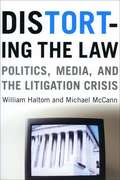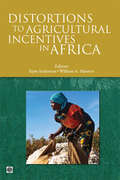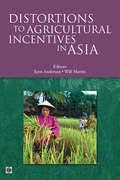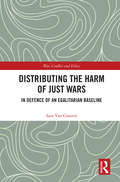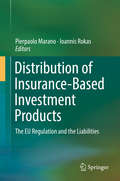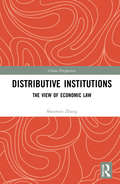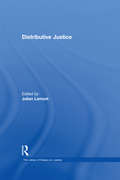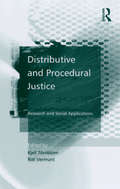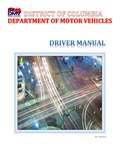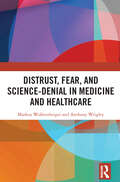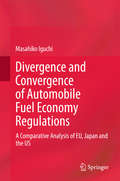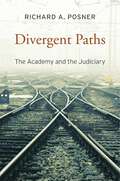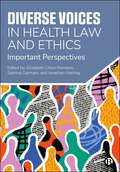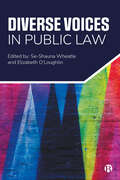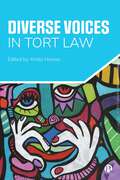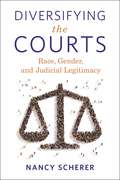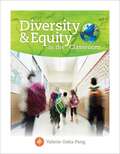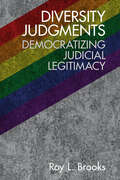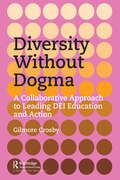- Table View
- List View
Distant Strangers
by Judith LichtenbergWhat must affluent people do to alleviate global poverty? This question has occupied moral and political philosophers for forty years. But the controversy has reached an impasse: approaches like utilitarianism and libertarianism either demand too much of ordinary mortals or else let them off the hook. In Distant Strangers, Judith Lichtenberg shows how a preoccupation with standard moral theories and with the concepts of duty and obligation have led philosophers astray. She argues that there are serious limits to what can be demanded of ordinary human beings, but this does not mean we must abandon the moral imperative to reduce poverty. Drawing on findings from behavioral economics and psychology, she shows how we can motivate better-off people to lessen poverty without demanding unrealistic levels of moral virtue. Lichtenberg argues convincingly that this approach is not only practically, but morally, appropriate.
Distorting the Law: Politics, Media, and the Litigation Crisis (Chicago Series In Law And Society Ser.)
by William Haltom Michael McCannIn recent years, stories of reckless lawyers and greedy citizens have given the legal system, and victims in general, a bad name. Many Americans have come to believe that we live in the land of the litigious, where frivolous lawsuits and absurdly high settlements reign. Scholars have argued for years that this common view of the depraved ruin of our civil legal system is a myth, but their research and statistics rarely make the news. William Haltom and Michael McCann here persuasively show how popularized distorted understandings of tort litigation (or tort tales) have been perpetuated by the mass media and reform proponents. Distorting the Law lays bare how media coverage has sensationalized lawsuits and sympathetically portrayed corporate interests, supporting big business and reinforcing negative stereotypes of law practices. Based on extensive interviews, nearly two decades of newspaper coverage, and in-depth studies of the McDonald's coffee case and tobacco litigation, Distorting the Law offers a compelling analysis of the presumed litigation crisis, the campaign for tort law reform, and the crucial role the media play in this process.
Distortions to Agricultural Incentives in Africa
by Kym Anderson William A. MastersThe vast majority of the world's poorest households depend on farming for their livelihoods. During the 1960s and 1970s, most developing countries imposed pro-urban and anti-agricultural policies, while many high-income countries restricted agricultural imports and subsidized their farmers. Both sets of policies inhibited economic growth and poverty alleviation in developing countries. Although progress has been made over the past two decades to reduce those policy biases, many trade- and welfare-reducing price distortions remain between agriculture and other sectors and within the agricultural sector of both rich and poor countries. Comprehensive empirical studies of the disarray in world agricultural markets appeared approximately 20 years ago. Since then, the Organisation for Economic Co-operation and Development has provided estimates each year of market distortions in high-income countries, but there have been no comparable estimates for the world's developing countries. This volume is the third in a series (other volumes cover Asia, Europe's transition economies, and Latin America and the Caribbean) that not only fills that void for recent years but extends the estimates in a consistent and comparable way back in time-and provides analytical narratives for scores of countries that shed light on the evolving nature and extent of policy interventions over the past half-century. 'Distortions to Agricultural Incentives in Africa' provides an overview of the evolution of distortions to agricultural incentives caused by price and trade policies in the Arab Republic of Egypt plus 20 countries that account for about of 90 percent of Sub-Saharan Africa's population, farm households, agricultural output, and overall GDP. Sectoral, trade, and exchange rate policies in the region have changed greatly since the 1950s, and there have been substantial reforms since the 1980s. Nonetheless, numerous price distortions in this region remain, others have been added in recent years, and there has also been some backsliding, such as in Zimbabwe. The new empirical indicators in these country studies provide a strong evidence-based foundation for assessing the successes and failures of the past and for evaluating policy options for the years ahead.
Distortions to Agricultural Incentives in Asia
by Kym Anderson Will MartinThe vast majority of the world's poorest households depend on farming for their livelihoods. During the 1960s and 1970s, most developing countries imposed pro-urban and anti-agricultural policies, while many high-income countries restricted agricultural imports and subsidized their farmers. Both sets of policies inhibited economic growth and poverty alleviation in developing countries. Although progress has been made over the past two decades to reduce those policy biases, many trade- and welfare-reducing price distortions remain between agriculture and other sectors and within the agricultural sector of both rich and poor countries. Comprehensive empirical studies of the disarray in world agricultural markets appeared approximately 20 years ago. Since then, the Organisation for Economic Co-operation and Development had provided estimates each year of market distortions in high-income countries, but there have been no comparable estimates for the world's developing countries. This volume is the third in a series (other volumes cover Africa, Europe's transition economics, and Latin America and the Caribbean) that not only fills that void for recent years but extends the estimates in a consistent and comparable way back in time-and provides analytical narratives for scores of countries that shed light on the evolving nature and extent of policy interventions over the past half-century. 'Distortions to Agricultural Incentives in Asia' provides an overview of the evolution of distortions to agricultural incentives caused by price and trade policies in the 12 largest economies of East and South Asia. Together these countries constitute more than 95 percent of the region's population, agricultural output, and overall GDP. Sectoral, trade, and exchange rate policies in the region have changed greatly since the 1950s, and there have been substantial reforms since the 1980s, most notably in China and India. Nonetheless, numerous price distortions in this region remain and others have added in recent years. The new empirical indicators in these country studies provide a strong evidence-based foundation for assessing the successes and failures of the past and for evaluating policy options for the years ahead.
Distributing the Harm of Just Wars: In Defence of an Egalitarian Baseline Approach (War, Conflict and Ethics)
by Sara Van GoozenThis book argues that the risk of harm in armed conflict should be divided equally between combatants and enemy non-combatants. International law requires that combatants in war take ‘all feasible precautions’ to minimize damage to civilian objects, injury to civilians, and incidental loss of civilian life. However, there is no clear explanation of what ‘feasible precautions’ means in this context, or what would count as sufficiently minimised incidental harm. As a result, it is difficult to judge whether a particular war or offensive actually satisfies this requirement. Just war theorists often consider it common sense that merely not intending to harm innocent civilians is not sufficient, but there is little clarity in the literature regarding what this means. One crucial question that is almost always overlooked is that of what the appropriate baseline distribution of risk should be. This book defends the Minimal Harm Requirement (MHR), which states that combatants should make an effort to reduce merely foreseen harm to enemy non-combatants to the lowest reasonable level. In order to assess which risk impositions are reasonable, and which are not, an egalitarian baseline should be adopted, suggesting that other things being equal risk of harm should be distributed equally between just combatants and unjust non-combatants. This book will be of much interest to students of just war theory, ethics, security studies and international relations.
Distribution of Insurance-Based Investment Products: The EU Regulation and the Liabilities
by Pierpaolo Marano Ioannis RokasThe book addresses a topic at the intersection of two heavily regulated sectors: insurance and investment services. Until recently, scholars and professionals have approached insurance and investment services as two separate categories in the financial services sector, and as being governed by separate regulatory frameworks. In practice, however, the boundaries were and are blurred, a reality that regulators have begun to recognize and address in their more recent regulatory texts. The first part of the book approaches the new standards applicable to investment products based on insurance: insurance-based investment products (IBIPs). These rules are harmonized across the EU. The rationale behind this new definition is provided, together with a description of these products’ limitations. The analysis addresses the new rules and explores the legal regime and relevant standards applicable to IBIPs. The organizational rules concerning the design and distribution of IBIPs are also examined, and the book highlights e.g. how these rules are inspired by the principles of conduct. In closing, the ADR systems are analysed, in order to ascertain whether or not they can offer an effective tool for settling disputes over these products. In turn, the second part focuses on the liability for distribution of IBIPs, which ranks as one of the most conspicuous and relatively new legal phenomena, but at the same time, represents an exceptionally important field of civil liability in today’s world. Liability is still regulated at the national level. Thus, the four largest life insurance markets in the EU are considered, along with the largest emerging market for life insurance. The chapters on national laws also consider whether, and if so, how the new harmonized rules on IBIPs are being combined with those already in force in the jurisdictions considered. The goal is to determine whether the new rules are likely to change the doctrine and case law approach to these products, or whether the European legislators’ choices have no real impact on the protection of clients.
Distribution of Responsibilities in International Law (Shared Responsibility in International Law)
by André Nollkaemper Dov JacobsThis is the second book in the series Shared Responsibility in International Law, which examines the problem of distribution of responsibilities among multiple states and other actors. In its work on the responsibility of states and international organisations, the International Law Commission recognised that attribution of acts to one actor does not exclude possible attribution of the same act to another state or organisation. However, it provided limited guidance for the often complex question of how responsibility is to be distributed among wrongdoing actors. This study fills that gap by shedding light on principles of distribution from extra-legal perspectives. Drawing on disciplines such as political theory, moral philosophy, and economics, this volume enquires into the bases and justifications for apportionment of responsibilities that can support a critique of current international law, offers insight into the justification of alternative interpretations, and provides inspiration for reform and further development of international law. Examines the conceptual and theoretical underpinnings of how responsibility is distributed among wrongdoing actors. Explains normative choices that inevitably underlie particular legal decisions on distribution from extra-legal perspectives. Brings together multiple perspectives from different disciplines and makes comparisons between multiple options for distributing responsibility under international law.
Distributive Institutions: The View of Economic Law (China Perspectives)
by Shouwen ZhangThe crisis of distribution is one of the longest standing and most complicated issues facing human society. Imbued with social, political, historic, and cultural elements, it varies significantly across different countries as a result of all these factors. As an emerging economy which transferred from a planned to a market economy, China has experienced large distribution gaps since it implemented the Reform and Opening-up Policy in the early 1980s, requiring stronger economic law to mitigate and regulate the crisis of distribution. In this second volume, the author analyses crises of distribution from a theoretical perspective and proposes law and policy solutions. Believing that such crises are a collective result of systematic limitations, the author proposes a theoretical framework of “system–distribution–development” in order to resolve distribution problems and promote economic development. He argues that a crisis of distribution cannot be avoided without coordinated development of economic law and relevant constitutional, civil, and commercial law systems. In addition, it is necessary to differentiate the territories, industries, enterprises, and individuals that constitute such diverse systems. The book should be of keen interest to researchers and students of law, economics, and political science.
Distributive Justice (The Library of Essays on Justice)
by Julian LamontA central component of justice is how the economic goods are distributed in a society. Philosophers contribute to distributive justice debates by providing arguments for principles to guide and evaluate the allocation of economic goods and to guide the design of institutions to achieve more just distributions. This volume includes both seminal and recent work by philosophers, covering a range of representative positions, including libertarian, egalitarian, desert, and welfare theorists. The introduction to the volume and the selections themselves are designed to allow students and professionals to see some of the most influential pieces that have shaped the field, as well as some key critics of these positions. The articles intersect in such a way as to develop an appreciation of the types of theories and the central issues addressed by theories of distributive justice. Furthermore, the choice of authors in this collection reflects an appreciation of the influence of institutions in general, markets in particular, and even luck on the distribution of economic goods.
Distributive Justice and Access to Advantage
by Alexander KaufmanG. A. Cohen was one of the world's leading political theorists. He was noted, in particular, for his contributions to the literature of egalitarian justice. Cohen's classic writings offer one of the most influential responses to the currency of the egalitarian justice question – the question, that is, of whether egalitarians should seek to equalize welfare, resources, opportunity, or some other indicator of well-being. Underlying Cohen's argument is the intuition that the purpose of egalitarianism is to eliminate disadvantage for which it is inappropriate to hold the person responsible. His argument therefore focuses on the appropriate role of considerations regarding responsibility in egalitarian judgment. This volume comprises chapters by major scholars addressing and responding both to Cohen's account of the currency of egalitarian justice and its practical implications and to Cohen's arguments regarding the appropriate form of justificatory arguments about justice.
Distributive and Procedural Justice: Research and Social Applications
by Kjell Törnblom Riël VermuntThis interdisciplinary and cross-national volume brings together theory and research by prominent scholars within the areas of distributive and procedural justice, not only featuring work within each area separately, as is commonly done, but also showing how combinations of the two justice orientations might operate to affect justice judgments and guide behaviour. Chapters cover various levels of analysis, from intra-personal to interpersonal to group and societal levels. The volume is divided into four sections: distributive justice, procedural justice, distributive and procedural justice, and methodological issues. Each section is subdivided into two parts, basic research and applied research re: current and important societal issues. Each chapter contains an overview of theoretical and empirical research on a particular topic. The volume is designed for use on courses in social psychology, psychology, sociology, political philosophy, and law.
District of Columbia Driver Manual
by District of Columbia Department of Motor VehiclesThis manual provides information on safe driving rules and practices all drivers should know. This manual provides information on all aspects of driving. Be sure to read the entire manual carefully. If you do not read and study this manual, you will not pass the knowledge test required for obtaining a DC driver license. You will not be permitted to refer to this manual while taking the examination.
Distrust, Fear, and Science-Denial in Medicine and Healthcare
by Anthony Wrigley Markus WolfensbergerOver recent decades, the decline of trust, mounting of fears, and increasing denial of science appear as a marked shift of societal attitudes towards many institutions and professionals. This book analyses these developments and looks at their role in medicine and healthcare, both in terms of the patient-physician relationship and for delivering high-quality healthcare, in order to establish why we need trust and what can be done to restore it. The book begins by offering a conceptual analysis and definition of trust, using a ‘pattern definition’ based upon typical features and common usage of the term, as well as the related concepts of hope, fear, and belief. It charts evidence for the decline of public trust in various professions, and then looks at the causes, as well as the accompanying growth of fear and the rejection of science. The study addresses possible options for restoring trust in medicine and healthcare, be it in individual physicians, in hospitals, or in managed care institutions. Written jointly by a medical doctor and an academic specialising in biomedical ethics, the book will be of interest to those working in the areas of biomedical ethics and law, medicine and healthcare, public health, philosophy, sociology, politics, and psychology.
Divergence and Convergence of Automobile Fuel Economy Regulations
by Masahiko IguchiThis book reveals the mechanisms underlying the convergence of car fuel economy regulations in Europe, Japan and the US by drawing upon a constructivist theory of International Relations and law that focuses on business competition and environmental regulations. It offers new understanding of the topic of cars and an issue of climate change, discussing the emerging phenomenon of convergence of fuel economy regulations; addressing the role of business actors in pushing for climate change action; proposing the new model of agency with and beyond states; and providing insightful case studies from Europe, Japan and the US. The opening chapter reviews the automobile industry and global climate change, providing a background for the discussion to follow. Chapter 2, Business Actors and Global Environmental Governance, grounds the discussion in the field of environmental governance. The third chapter is a case study examining the construction and timing of the European Union's climate policies for automobile CO2 emissions, discussing the underlying factors and the actors influencing the policies. The following chapter argues that Japan adopted its stringent fuel economy regulations primarily because of industry competitiveness, motivated by stringent environmental regulations in export markets and encouraged by a tradition of 'co-regulation' and 'corporatism' to enhance the regulations. Chapter 5 asks why the US, the first country to introduce fuel economy regulations, spent two decades in regulatory stagnation, and discusses how recent US fuel economy regulations came to converge with Japanese and European standards. Chapter 6 compares, contrasts and analyzes fuel economy regulations among the three case studies and identifies policy implications for the future climate governance for 2015 and beyond. The final chapter explores applicability of the 'agency with and beyond the state' model to other sectors and to climate governance as a whole.
Divergent Paths
by Richard A. PosnerJudges and legal scholars talk past one another, if they have any conversation at all. Academics criticize judicial decisions in theoretical terms, which leads many judges to dismiss academic discourse as divorced from reality. Richard Posner reflects on the causes and consequences of this widening gap and what can be done to close it.
Diverse Voices in Health Law and Ethics: Important Perspectives (Diverse Voices)
by Elizabeth Chloe Romanis, Sabrina Germain, and Jonathan HerringIlluminating the often-overlooked perspectives of marginalised groups, this essential textbook offers a transformative exploration of health law and ethics. Designed as a replacement for (or complement to) foundational health law texts, the book amplifies the voices of those frequently silenced in teaching materials: racialised communities, ethnic minorities, women, disabled individuals, LGBTQI+ people and those disadvantaged by socio-economic and structural factors. Chapters cover key topics such as abortion, medical negligence, and public health, scrutinising how traditional legal narratives can neglect the nuanced impacts on these diverse groups. Contributors challenge readers to reflect on the production and perpetuation of health inequalities, enriching the curriculum with critical viewpoints. Teaching tools include: - accessible summaries throughout the chapters; - critical reflection questions at the end of each chapter for students and teachers; - further reading lists and links to external resources.. This is an invaluable text that encourages students and academics to engage deeply with the intersections of law, health(care) and social justice. It is an indispensable companion for any health law course, fostering a more inclusive and well-rounded approach to legal and medical education and practice.
Diverse Voices in Public Law
by Se-shauna Wheatle and Elizabeth O’LoughlinTaking a unique and critical approach to the study of Public Law, this book explores the main topics in UK Public Law from a range of underexplored perspectives and amplifies the voices of scholars who are underrepresented in the field. As such, it represents a much-needed complement to traditional textbooks in Public Law. Including insights from a diverse list of contributors, the book: • Enriches students’ understanding of the dynamics that emerge within public law; • Highlights the impact of historical and societal inequities on public law norms; • Demonstrates the ways in which those norms may impact minorities and perpetuate inequalities. With most chapters written by underrepresented or minoritised persons in the field, this text offers students a critical, rich, and insightful approach to public law.
Diverse Voices in Tort Law
by Kirsty HorseyThis captivating book explores uncharted territory in tort law, shedding light on underexplored viewpoints in the field. The collection brings issues of social class, race, gender, marginalisation, vulnerability and harm into conversation with core tort law topics to encourage a more critical examination of the law and its impact on different groups of people. Written by experts in the main areas of tort law from negligence to defamation and personal torts, chapters will: • deepen students’ understanding of the central concepts and practices of tort law; • uncover the power imbalances and privileges that underpin tort law decisions and their impact on lived experiences; • amplify under-represented voices by signposting to the work and ideas of scholars that are less visible in the field. Integrating marginalised perspectives into the curriculum and discourse, this indispensable textbook paves the way for a more inclusive and comprehensive understanding of tort law. Chapter 9 available open access digitally under CC-BY licence.
Diversifying the Courts: Race, Gender, and Judicial Legitimacy
by Nancy SchererExamines the decisions of US presidents to appoint judges from diverse backgrounds to federal courtsIn Diversifying the Courts, Nancy Scherer addresses why presidents choose—or don’t choose—to diversify the federal courts by race, ethnicity, and gender. She explores how and why the issue became a bitter partisan fight in the first place, tracking the controversial history—and politics—of court diversification.Drawing on polls, political experiments, surveys and one-on-one interviews, Scherer illuminates the complicated relationship between diversity and court legitimacy. She shows us how diverse representation can positively impact perceptions of the court among women and racial minorities, while having a negative impact on the perceptions among white people and men. Ultimately, Diversifying the Courts provides insight into the impact of gender, race, and ethnicity on the courts, illuminating some of the major challenges facing the American judicial system in the years that lie ahead.
Diversity And Equity In The Classroom
by Valerie Ooka PangLearning how to use a variety of instructional methods to reach diverse students is vital in schools today. DIVERSITY AND EQUITY IN THE CLASSROOM will teach you how to bridge the gap between theory and practice using a student-centered and culture-centered approach based on a philosophy of social justice and equal outcomes for all students. You will learn why you should think about and value student culture, and how to weave those values into the curriculum and classroom. Guided by social constructivism as the cognitive foundation for learning, the text emphasizes the intersectionality of diverse identities, provides effective methods and strategies that you can use in the classroom to address prejudice and teach culturally diverse students, and prompts you to examine your own biases. Checklists, tips, and tools for classroom use are presented in every chapter and available electronically as Professional Resource Downloads in the online MindTap that supports the text. Important Notice: Media content referenced within the product description or the product text may not be available in the ebook version.
Diversity Judgments: Democratizing Judicial Legitimacy
by Roy L. BrooksThe US Supreme Court's legitimacy-its diminishing integrity and contribution to the good of society-is being questioned today like no other time in recent memory. Criticisms reflect the perspectives of both 'insiders' (straight white males) and 'outsiders' (mainly people of color, women, and the LGBTQ community). Neither perspective digs deep enough to get at the root of the Court's legitimacy problem, which is one of process. The Court's process of decision-making is antiquated and out of sync with a society that looks and thinks nothing like the America of the eighteenth century, when the process was first implemented. The current process marginalizes many Americans who have a right to feel disenfranchised. Leading scholar of jurisprudence Roy L. Brooks demonstrates how the Court can modernize and democratize its deliberative process, to be more inclusive of the values and life experiences of Americans who are not straight white males.
Diversity Leadership in the U.S. Department of Defense: Analysis of the Key Roles, Responsibilities, and Attributes of Diversity Leaders
by Jefferson P. Marquis Jerry M. Sollinger Kirsten M. Keller Beth Katz Maria C. LytellThis study identifies the knowledge, skills, abilities, and other personal characteristics needed in individuals who will be responsible for implementing strategic diversity plans in the Department of Defense (DoD). The authors interviewed more than 60 diversity leaders in industry, the public sector (including DoD), and academia and reviewed relevant scientific literature, education programs, and advertised job requirements.
Diversity Management 2035: Entwicklung einer Zukunftsutopie für Organisationen in Deutschland (BestMasters)
by Lena GrezellaLena Grezella widmet sich mit ihrem Buch der Utopie eines Diversity Managements in Organisationen des Jahres 2035 in Deutschland. In ihrem Text entwirft sie ein wünschenswertes Zukunftsbild, das mögliche und wahrscheinliche gesellschaftliche Entwicklungen in ihre umfassenden Betrachtungen einbezieht. Die Autorin greift im Rahmen eines qualitativen Forschungsdesigns auf Sachverständigenwissen zurück, um Erkenntnisse über das organisationale Diversity Management der Zukunft zu gewinnen. In den Ergebnissen beschreibt sie Veränderungen für organisationales Handeln und den Umgang mit Vielfalt bis in das Jahr 2035, aus denen sich neue Handlungsfelder für das Diversity Management in Deutschland ergeben. Dabei zeigt die Autorin Vorstellungen über die zukünftige strukturelle Verankerung von Diversity Management sowie die Verantwortlichkeit für diversitybezogene Maßnahmen auf. Damit entwickelt sie ein zukunftsorientiertes Verständnis von Diversity Management und stellt die Merkmale vor, die organisationalen Umgang mit Vielfalt zukünftig ausmachen sollten.
Diversity Without Dogma: A Collaborative Approach to Leading DEI Education and Action
by Gilmore CrosbySocial Scientist Kurt Lewin said, "No research without action, and no action without research." Too much of the current DEI (diversity, equity, and inclusion) approach is insight-based instead of action-based. Even though institutional racism is identified as the root problem, the change effort is focused on looking inward for bias instead of taking action to eliminate institutional racism and other isms. A Lewinian approach, in contrast, is balanced. What people think is important, but no more important than what people do. If you bring people together to change things, this will change what people think! We don’t need therapy nearly as much as we need action based on dialogue! Instead of spending your energy soul-searching for evidence in your thoughts and behaviors that you have unconscious biases, this book helps put your energy into doing something practical about racism. To get there, this book uses Lewin’s social science to build a framework for sorting through the many approaches to and positions held on race, racism, diversity, and related topics. While the framework is and must be applicable to any prejudice, systemic or individual, the bulk of this exploration is focused on racism, which to a large degree has become the primary social justice focus of our times. Painfully aware that conversations about race can easily deteriorate into polarization, the author lays a path toward finding common ground.
Diversity and Disagreement: From Fundamental Biases to Ethical Interactions
by Edward T. Cokely Adam FeltzThis book details the discovery and exploration of one of the major scientific revelations that has emerged from the field of experimental philosophy—i.e., that heritable personality traits often predict philosophical diversity and disagreement, and may help explain fundamental philosophical biases. Adam Feltz and Edward T. Cokely provide historical and personal perspectives on this differential approach within experimental philosophy and discuss how theoretical considerations and insights have started to have practical impact on practice in risk communication, law, medicine, public policy, and engineering (e.g., science for informed decision making; the ethics of choice architecture and nudges). The main goal in this book is to provide a theoretical framework for understanding variation in fundamental philosophical intuitions and how that variation informs ethical interaction theory. This is an open access book.

